SEO
How to Learn SEO (Complete Roadmap)

Learning SEO can seem overwhelming. It’s a complex topic, and the industry is rife with misinformation. But with a bit of time, effort, and the right roadmap, it’s something that anyone can learn.
Here’s the roadmap we’ll cover in this guide:

Let’s get to it.
- Learn SEO fundamentals
- Put your knowledge into practice
- Deepen your SEO knowledge
- Keep your finger on the pulse
- Teach others what you know
If you’re not already familiar with the basics of SEO, this is where you should start. Specifically, you need to understand how search engines work and the four main facets of SEO. Let’s go through these real quick.
How search engines work
Search engines work by finding content and storing it in a big index. They then use complex processes, also known as search algorithms, to rank content from the index when a user performs a search. In other words, when you search for something on Google, you’re not searching the entire web—you’re searching Google’s index.
This means that if Google can’t find and index your content, you can’t rank because you won’t be indexed.
Google builds its index from two main sources:
- Sitemaps – A sitemap is a file listing all the important pages on your website that you want search engines to index. You can submit your sitemap to Google to tell it that your pages exist.
- Links from known webpages – Google already has billions of pages in its index. If you get a link from one of those pages, Google can “follow” the link to discover your page.
Note that Google can discover new pages on your website by “following” links from known pages on your website too.
For example, if Google already has your blog homepage in its index, you can link internally to newly published blog posts from there. Google would be able to “follow” these links to discover newly published posts on your blog.
Learn more: How Do Search Engines Work and Why Should You Care?
Keyword research
Keyword research is the process of finding what your customers are searching for. It’s important because you won’t get discovered if people aren’t searching for the keywords you target.
Because Google doesn’t exactly make this information accessible, the best way to find keywords is with a keyword research tool like Ahrefs’ Keywords Explorer. To use it, enter one or a few broad topics related to your industry, hit search, then go to one of the keyword ideas reports. You’ll see the keywords’ monthly search volumes and a few other SEO metrics.

In Keywords Explorer, we also show the “Traffic Potential” metric for each keyword. This estimates how much traffic the current top-ranking page for the keyword gets, which is usually a good indicator of how much traffic you can get by ranking #1.

As pages tend to rank for more than one keyword, “Traffic Potential” usually gives a more accurate estimate of a keyword’s potential than its search volume.
Learn more: How to Do Keyword Research for SEO
On-page SEO
On-page SEO is where you optimize the content on your page to rank higher on search engines. It revolves heavily around understanding what searchers want and giving it to them—a process known as optimizing for search intent.
For example, if we look at the top results for the keyword “best protein powder,” we see that they’re all blog posts comparing top picks:

This tells us that although searchers are in the market for a protein powder, they’re still weighing up their options and aren’t quite ready to buy. As a result, it would be tough to rank an e‑commerce product page for this query. That’s not what searchers want.
Learn more: On-Page SEO: Complete Beginner’s Guide
Link building
Link building is the process of acquiring backlinks from other websites to your site. It’s important because backlinks are one of Google’s top three ranking factors.
This is probably why there’s a clear correlation between linking websites and organic traffic:

Not all links are created equal, however. Links from relevant and high-quality websites usually move the needle more than links from irrelevant and low-quality websites. In other words, if your site is about Bitcoin, a link from a website about cryptocurrencies will likely positively impact rankings more than one from a website about travel.
Building high-quality links to your website is arguably one of the most challenging aspects of SEO and one of the most in-demand SEO skills.
Learn more: The Beginner’s Guide to Link Building
Technical SEO
Technical SEO ensures that search engines like Google can find, crawl, and index your content. Unless they can do all three of these things, it’s unlikely that your pages will show up in the search results.
Let’s take a look at these three things in more detail.
- Find – Google first needs to know that your page exists and where to find it.
- Crawl – Google now needs permission to crawl the page. That’s where a computer program downloads the page’s content.
- Index – Google now needs permission to add your page to its index.
You can solve the first part of the process by ensuring that your page has links from other known pages on your website and is in a sitemap that you’ve submitted to Google.
As for crawling and indexing, you need to ensure that you’re not blocking Google from doing either of these things. This is done using a file called robots.txt (crawling) and a meta tag called meta robots (indexing).
Learn more: The Beginner’s Guide to Technical SEO
Here’s an apt quote:
Knowing SEO theory is one thing; applying that knowledge to rank a website is another thing entirely. You’ll learn more about SEO in the trenches than any other way.
For example, when I was getting started in SEO, I created a bodybuilding website, as I was interested in the topic at the time. First, I made sure my technical SEO was on point and that Google could find, crawl, and index any content I published. I then did some keyword research to find topics to cover. After that, I began publishing optimized content.
Here’s the first post I published in August 2012:

Finally, I built some links.
Here’s one of the links I built with a guest post (it’s still live today… 10 years later!):

This website ended up doing quite well, which validated that the SEO theory I’d learned made sense. However, I made some mistakes too. For example, I distinctly recall the rankings for a page tanking after randomly deciding to rewrite the copy. This taught me a valuable lesson that I didn’t learn elsewhere: If it ain’t broke, don’t fix it!
It’s impossible to learn absolutely everything about every facet of SEO. The topic is just too broad. So now that you’ve spent some time in the trenches and learned which aspects of SEO you enjoy, it’s time to niche down and deepen your knowledge in one area.
This is known as becoming a t‑shaped SEO.

Being a t‑shaped SEO means that you have a broad knowledge of all things SEO but excel in one particular area. The area you choose to specialize in should be one that you’re best at and most enjoy.
For me, this is link building—which is why I’ve written much of our content about this topic.
Here are a few more examples of t‑shaped SEOs:
Notice how Marie Haynes’ specialty is hyperspecific? Instead of choosing one broad facet of SEO (e.g., keyword research or link building), she decided to specialize in the niche area of Google penalty recovery. As a result, there’s probably no SEO on the planet that knows more about this topic than Marie.
Going hyperspecific like this is a good idea if you’re learning SEO to become an in-demand SEO expert. But if you’re looking to rank websites, it’s probably better to keep things slightly broader and stick with one of the four main facets of SEO.
Either way, you should always test what you learn on your website. This is where true learning happens.
Despite what many people say, the fundamentals of SEO barely change. But small things are constantly changing. There are Google updates multiple times a year, changes to how search engines handle aspects of technical SEO, smart folks coming up with new tactics, etc.
With this in mind, while you shouldn’t spend all day every day reading SEO news, it’s important to keep your finger on the pulse.
Here are a few ways to do that:
Attend SEO conferences and meetups
SEO is a big industry with big conferences. For example, BrightonSEO attracts more than 4,000 attendees. There are numerous smaller meetups too, which you can find on meetup.com, such as this one in my hometown. These are all places where like-minded people doing SEO share insights and tactics, so there’s a lot to learn from getting involved.
Learn more: 7 SEO Conferences (Online and Offline) to Attend
Listen to SEO podcasts
Podcasters often interview smart SEOs about their successes, failures, and experiences, making podcasts a great way to keep your finger on the pulse while on the go. For example, in this episode of the Authority Hacker podcast, link building extraordinaire Bibi shares her creative approach to link outreach emails.
Learn more: 15 Podcasts to Boost Your SEO Game
Join SEO Facebook groups
Facebook has an active community of SEOs who are always willing to answer questions and offer advice should you need it. In fact, our Facebook group, Ahrefs Insider, has almost 17K members and is very active.
Learn more: 4 Best Facebook Groups for SEOs (Most Voted For)
Join SEO Slack communities
If you’d prefer not to be distracted by Facebook, consider joining an SEO Slack community. Some are free, whereas others charge a monthly subscription. Traffic Think Tank (TTT) is a good choice if you’re open to paid communities.
Learn more: 11 Slack Communities for SEOs and Digital Marketers
Read SEO blogs
… Like the one you’re reading, where we often publish unique ideas, processes, and studies. For example, when Google switched to relying less on title tags to generate SERP titles, we studied almost a million pages and published the results for the community.
Learn more: 29 Awesome SEO Blogs to Follow (Graded and Ranked)
Watch SEO YouTube videos
… Like our YouTube channel, where we publish similar content to our blog.
Official sources
Google publishes official algorithm updates and announcements on the Search Console Blog and hosts weekly “office hours” hangouts on its YouTube channel. You can also follow Google search representatives like John Mueller and Gary Illyes on Twitter.
Read SEO news
Search Engine Roundtable describes itself as the pulse of search marketing and publishes daily updates on everything search. Search Engine Land and Search Engine Journal also frequently publish news.
Look back at the roadmap, and you’ll see a recommendation to share what you learn with others.

This may seem counterintuitive, given that you want to learn more about SEO, but I find that teaching others helps me retain and assimilate knowledge. I think it’s because it forces me to articulate things, which often leads me to conclude that I don’t know as much as I thought I knew.
While you can do this publicly on a blog or YouTube channel, you can also do it semi-privately (in groups and communities) or privately (direct messages, face-to-face).
If you’re thick-skinned enough, doing it publicly often provides an extra line of defense against misinformation because people are usually kind enough to call you out when you get things wrong.
For example, here’s Bill Slawski pointing out an inaccurate claim in one of my articles on Twitter:

This leads me to an important point…
Don’t try to teach others SEO unless one of these things is true:
- You’ve thoroughly researched and understood what you’re teaching.
- You’re teaching something based on personal experience and testing (and you’ve made that fact clear).
The last thing you want to do is contribute more misinformation to an industry already rife with it.
Final thoughts
The famous psychologist, K. Anders Ericsson, theorized that learning a new skill takes 10,000 hours of practice. You’ll certainly gain a good understanding of SEO in that time, but the truth is that you never stop learning. I’ve been involved in SEO for 11+ years, and I learn new things all the time.
But remember, learning isn’t only about reading and retaining information. It’s also about putting what you read into practice, testing things for yourself, and finding ways to improve on conventional wisdom over time.
Got questions? Ping me on Twitter.
SEO
How to Find and Use Competitor Keywords

Competitor keywords are the keywords your rivals rank for in Google’s search results. They may rank organically or pay for Google Ads to rank in the paid results.
Knowing your competitors’ keywords is the easiest form of keyword research. If your competitors rank for or target particular keywords, it might be worth it for you to target them, too.
There is no way to see your competitors’ keywords without a tool like Ahrefs, which has a database of keywords and the sites that rank for them. As far as we know, Ahrefs has the biggest database of these keywords.
How to find all the keywords your competitor ranks for
- Go to Ahrefs’ Site Explorer
- Enter your competitor’s domain
- Go to the Organic keywords report
The report is sorted by traffic to show you the keywords sending your competitor the most visits. For example, Mailchimp gets most of its organic traffic from the keyword “mailchimp.”


Since you’re unlikely to rank for your competitor’s brand, you might want to exclude branded keywords from the report. You can do this by adding a Keyword > Doesn’t contain filter. In this example, we’ll filter out keywords containing “mailchimp” or any potential misspellings:


If you’re a new brand competing with one that’s established, you might also want to look for popular low-difficulty keywords. You can do this by setting the Volume filter to a minimum of 500 and the KD filter to a maximum of 10.


How to find keywords your competitor ranks for, but you don’t
- Go to Competitive Analysis
- Enter your domain in the This target doesn’t rank for section
- Enter your competitor’s domain in the But these competitors do section


Hit “Show keyword opportunities,” and you’ll see all the keywords your competitor ranks for, but you don’t.


You can also add a Volume and KD filter to find popular, low-difficulty keywords in this report.


How to find keywords multiple competitors rank for, but you don’t
- Go to Competitive Analysis
- Enter your domain in the This target doesn’t rank for section
- Enter the domains of multiple competitors in the But these competitors do section


You’ll see all the keywords that at least one of these competitors ranks for, but you don’t.


You can also narrow the list down to keywords that all competitors rank for. Click on the Competitors’ positions filter and choose All 3 competitors:


- Go to Ahrefs’ Site Explorer
- Enter your competitor’s domain
- Go to the Paid keywords report


This report shows you the keywords your competitors are targeting via Google Ads.
Since your competitor is paying for traffic from these keywords, it may indicate that they’re profitable for them—and could be for you, too.
You know what keywords your competitors are ranking for or bidding on. But what do you do with them? There are basically three options.
1. Create pages to target these keywords
You can only rank for keywords if you have content about them. So, the most straightforward thing you can do for competitors’ keywords you want to rank for is to create pages to target them.
However, before you do this, it’s worth clustering your competitor’s keywords by Parent Topic. This will group keywords that mean the same or similar things so you can target them all with one page.
Here’s how to do that:
- Export your competitor’s keywords, either from the Organic Keywords or Content Gap report
- Paste them into Keywords Explorer
- Click the “Clusters by Parent Topic” tab


For example, MailChimp ranks for keywords like “what is digital marketing” and “digital marketing definition.” These and many others get clustered under the Parent Topic of “digital marketing” because people searching for them are all looking for the same thing: a definition of digital marketing. You only need to create one page to potentially rank for all these keywords.


2. Optimize existing content by filling subtopics
You don’t always need to create new content to rank for competitors’ keywords. Sometimes, you can optimize the content you already have to rank for them.
How do you know which keywords you can do this for? Try this:
- Export your competitor’s keywords
- Paste them into Keywords Explorer
- Click the “Clusters by Parent Topic” tab
- Look for Parent Topics you already have content about
For example, if we analyze our competitor, we can see that seven keywords they rank for fall under the Parent Topic of “press release template.”


If we search our site, we see that we already have a page about this topic.


If we click the caret and check the keywords in the cluster, we see keywords like “press release example” and “press release format.”


To rank for the keywords in the cluster, we can probably optimize the page we already have by adding sections about the subtopics of “press release examples” and “press release format.”
3. Target these keywords with Google Ads
Paid keywords are the simplest—look through the report and see if there are any relevant keywords you might want to target, too.
For example, Mailchimp is bidding for the keyword “how to create a newsletter.”


If you’re ConvertKit, you may also want to target this keyword since it’s relevant.
If you decide to target the same keyword via Google Ads, you can hover over the magnifying glass to see the ads your competitor is using.


You can also see the landing page your competitor directs ad traffic to under the URL column.


Learn more
Check out more tutorials on how to do competitor keyword analysis:
SEO
Google Confirms Links Are Not That Important

Google’s Gary Illyes confirmed at a recent search marketing conference that Google needs very few links, adding to the growing body of evidence that publishers need to focus on other factors. Gary tweeted confirmation that he indeed say those words.
Background Of Links For Ranking
Links were discovered in the late 1990’s to be a good signal for search engines to use for validating how authoritative a website is and then Google discovered soon after that anchor text could be used to provide semantic signals about what a webpage was about.
One of the most important research papers was Authoritative Sources in a Hyperlinked Environment by Jon M. Kleinberg, published around 1998 (link to research paper at the end of the article). The main discovery of this research paper is that there is too many web pages and there was no objective way to filter search results for quality in order to rank web pages for a subjective idea of relevance.
The author of the research paper discovered that links could be used as an objective filter for authoritativeness.
Kleinberg wrote:
“To provide effective search methods under these conditions, one needs a way to filter, from among a huge collection of relevant pages, a small set of the most “authoritative” or ‘definitive’ ones.”
This is the most influential research paper on links because it kick-started more research on ways to use links beyond as an authority metric but as a subjective metric for relevance.
Objective is something factual. Subjective is something that’s closer to an opinion. The founders of Google discovered how to use the subjective opinions of the Internet as a relevance metric for what to rank in the search results.
What Larry Page and Sergey Brin discovered and shared in their research paper (The Anatomy of a Large-Scale Hypertextual Web Search Engine – link at end of this article) was that it was possible to harness the power of anchor text to determine the subjective opinion of relevance from actual humans. It was essentially crowdsourcing the opinions of millions of website expressed through the link structure between each webpage.
What Did Gary Illyes Say About Links In 2024?
At a recent search conference in Bulgaria, Google’s Gary Illyes made a comment about how Google doesn’t really need that many links and how Google has made links less important.
Patrick Stox tweeted about what he heard at the search conference:
” ‘We need very few links to rank pages… Over the years we’ve made links less important.’ @methode #serpconf2024″
Google’s Gary Illyes tweeted a confirmation of that statement:
“I shouldn’t have said that… I definitely shouldn’t have said that”
Why Links Matter Less
The initial state of anchor text when Google first used links for ranking purposes was absolutely non-spammy, which is why it was so useful. Hyperlinks were primarily used as a way to send traffic from one website to another website.
But by 2004 or 2005 Google was using statistical analysis to detect manipulated links, then around 2004 “powered-by” links in website footers stopped passing anchor text value, and by 2006 links close to the words “advertising” stopped passing link value, links from directories stopped passing ranking value and by 2012 Google deployed a massive link algorithm called Penguin that destroyed the rankings of likely millions of websites, many of which were using guest posting.
The link signal eventually became so bad that Google decided in 2019 to selectively use nofollow links for ranking purposes. Google’s Gary Illyes confirmed that the change to nofollow was made because of the link signal.
Google Explicitly Confirms That Links Matter Less
In 2023 Google’s Gary Illyes shared at a PubCon Austin that links were not even in the top 3 of ranking factors. Then in March 2024, coinciding with the March 2024 Core Algorithm Update, Google updated their spam policies documentation to downplay the importance of links for ranking purposes.
The documentation previously said:
“Google uses links as an important factor in determining the relevancy of web pages.”
The update to the documentation that mentioned links was updated to remove the word important.
Links are not just listed as just another factor:
“Google uses links as a factor in determining the relevancy of web pages.”
At the beginning of April Google’s John Mueller advised that there are more useful SEO activities to engage on than links.
Mueller explained:
“There are more important things for websites nowadays, and over-focusing on links will often result in you wasting your time doing things that don’t make your website better overall”
Finally, Gary Illyes explicitly said that Google needs very few links to rank webpages and confirmed it.
I shouldn’t have said that… I definitely shouldn’t have said that
— Gary 鯨理/경리 Illyes (so official, trust me) (@methode) April 19, 2024
Why Google Doesn’t Need Links
The reason why Google doesn’t need many links is likely because of the extent of AI and natural language undertanding that Google uses in their algorithms. Google must be highly confident in its algorithm to be able to explicitly say that they don’t need it.
Way back when Google implemented the nofollow into the algorithm there were many link builders who sold comment spam links who continued to lie that comment spam still worked. As someone who started link building at the very beginning of modern SEO (I was the moderator of the link building forum at the #1 SEO forum of that time), I can say with confidence that links have stopped playing much of a role in rankings beginning several years ago, which is why I stopped about five or six years ago.
Read the research papers
Authoritative Sources in a Hyperlinked Environment – Jon M. Kleinberg (PDF)
The Anatomy of a Large-Scale Hypertextual Web Search Engine
Featured Image by Shutterstock/RYO Alexandre
SEO
How to Become an SEO Lead (10 Tips That Advanced My Career)
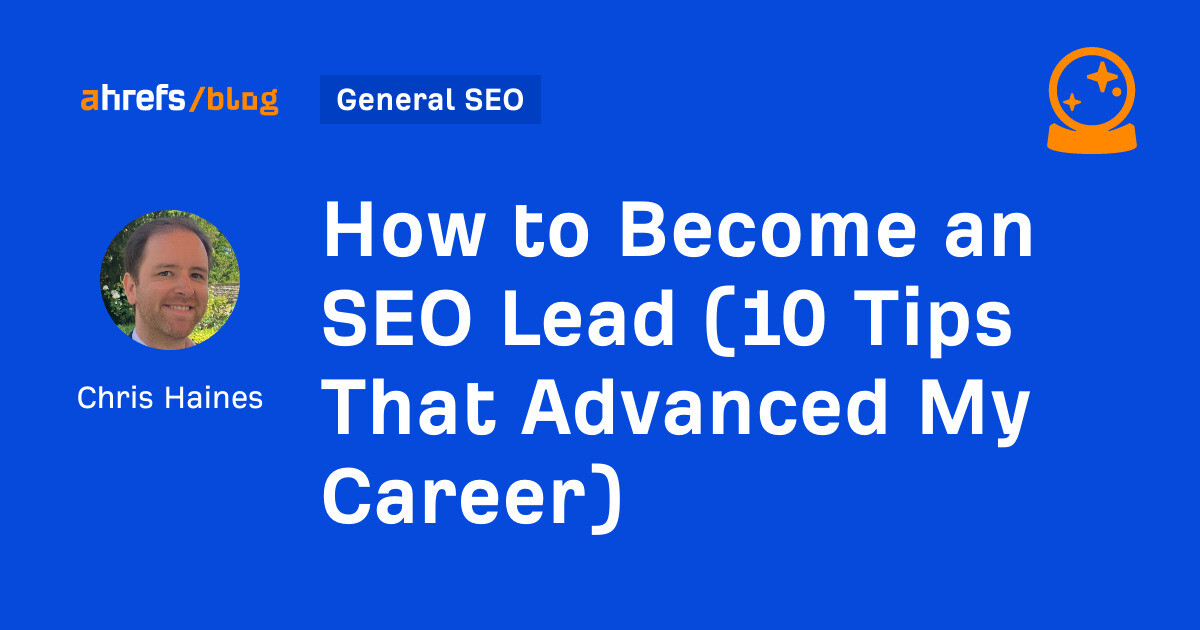
A few years ago, I was an SEO Lead managing enterprise clients’ SEO campaigns. It’s a senior role and takes a lot of work to get there. So how can you do it, too?
In this article, I’ll share ten tips to help you climb the next rung in the SEO career ladder.
Helping new hires in the SEO team is important if you want to become an SEO Lead. It gives you the experience to develop your leadership skills, and you can also share your knowledge and help others learn and grow.
It demonstrates you can explain things well, provide helpful feedback, and improve the team’s standard of work. It shows you care about the team’s success, which is essential for leaders. Bosses look for someone who can do their work well and help everyone improve.
Here are some practical examples of things I did early in my career to help mentor junior members of the team that you can try as well:
- Hold “lunch and learn” sessions on topics related to SEO and share case studies of work you have done
- Create process documents for the junior members of the team to show them how to complete specific tasks related to your work
- Compile lists of your favorite tools and resources for junior members of the team
- Create onboarding documents for interns joining the company
Wouldn’t it be great if you could look at every single SEO Lead’s resume? Well, you already can. You can infer ~70% of any SEO’s resume by spying on their LinkedIn and social media channels.
Type “SEO Lead” into LinkedIn and see what you get.
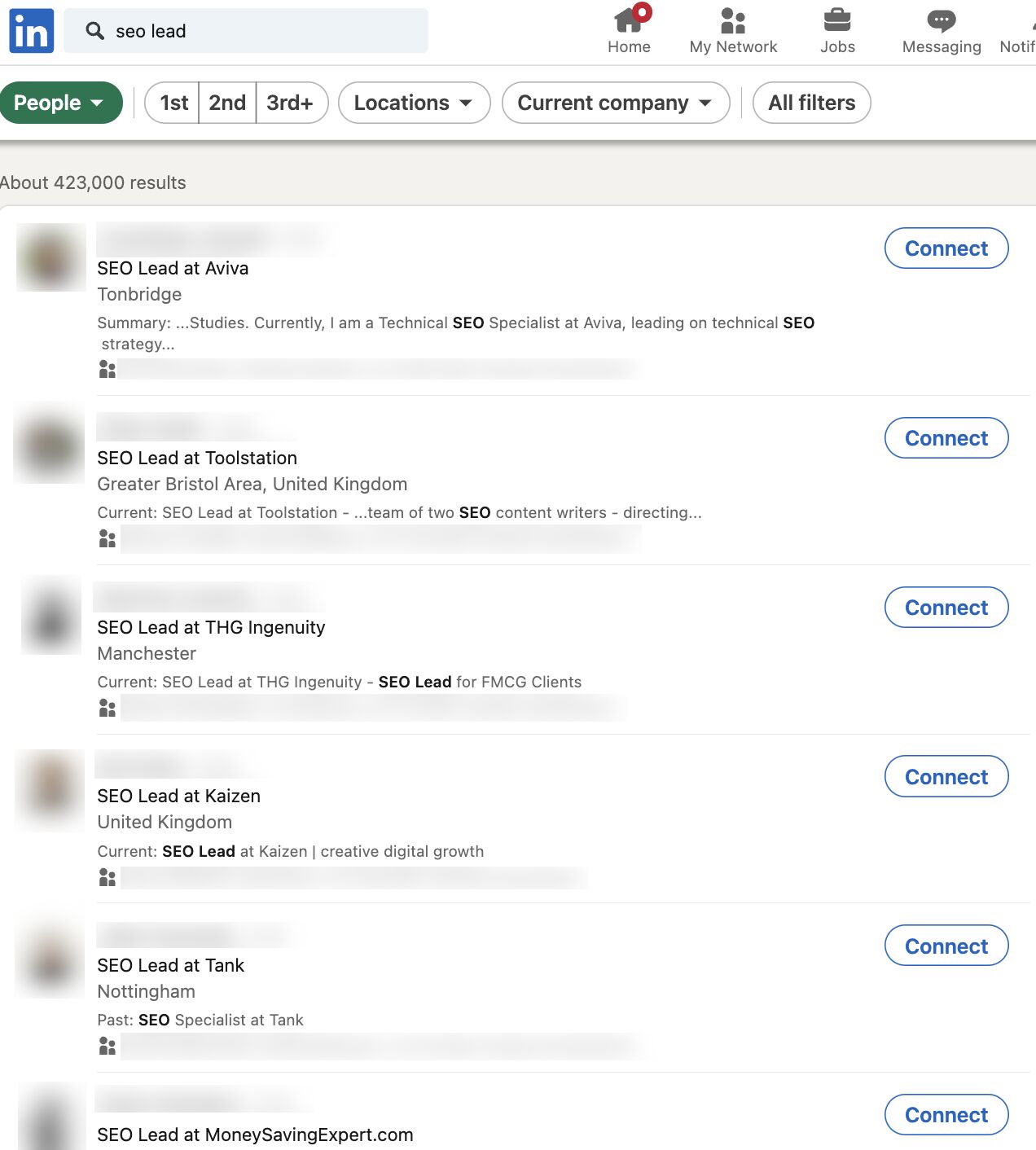
Tip
Look for common career patterns of the SEOs you admire in the industry.
I used this method to understand how my favorite SEOs and people at my company navigated their way from a junior role to a senior role.
For example, when the Head of SEO at the time Kirsty Hulse, joined my team, I added her on LinkedIn and realized that if I wanted to follow in her footsteps, I’d need to start by getting the role of SEO Manager to stand any possible chance of leading SEO campaigns like she was.
The progression in my company was from SEO Executive to Senior SEO Executive (Junior roles in London, UK), but as an outsider coming into the company, Kirsty showed me that it was possible to jump straight to SEO Manager given the right circumstances.
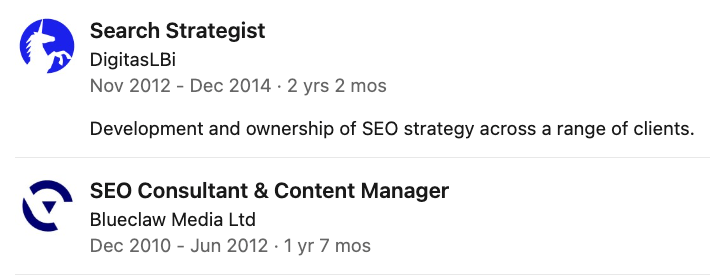

Using Kirsty’s and other SEOs’ profiles, I decided that the next step in my career needed to be SEO Manager, and at some point, I needed to get some experience with a bigger media agency so I could work my way up to leading an SEO campaign with bigger brands.
Sadly, you can’t just rock up to a monthly meeting and start leading a big brand SEO campaign. You’ll need to prove yourself to your line manager first. So how can you do this?
Here’s what I’d suggest you do:
- Create a strong track record with smaller companies.
- Obsessively share your wins with your company, so that senior management will already know you can deliver.
- At your performance review, tell your line manager that you want to work on bigger campaigns and take on more responsibility.
If there’s no hope of working with a big brand at your current job, you might need to consider looking for a new job where there is a recognizable brand. This was what I realized I needed to do if I wanted to get more experience.
Tip
Get recruiters on LinkedIn to give you the inside scoop on which brands or agencies are hiring. Ask them if you have any skill gaps on your resume that could prevent you from getting a job with these companies.
Being critical of your skill gaps can be hard to do. I found the best way to identify them early in my career was to ask other people—specifically recruiters. They had knowledge of the industry and were usually fairly honest as to what I needed to improve.
From this, I realized I lacked experience working with other teams—like PR, social, and development teams. As a junior SEO, your mind is focused 99% on doing SEO, but when you become more senior, your integration with other teams is important to your success.
For this reason, I’d suggest that aspiring SEO Leads should have a good working knowledge of how other teams outside of SEO operate. If you take the time to do this, it will pay dividends later in your career:
- If there are other teams in your company, ask if you can do some onboarding training with them.
- Get to know other team leads within your company and learn how they work.
- Take training courses to learn the fundamentals of other disciplines that complement SEO, such as Python, SQL, or content creation.
Sometimes, employers use skill gaps to pay you less, so it’s crucial to get the skills you need early on…
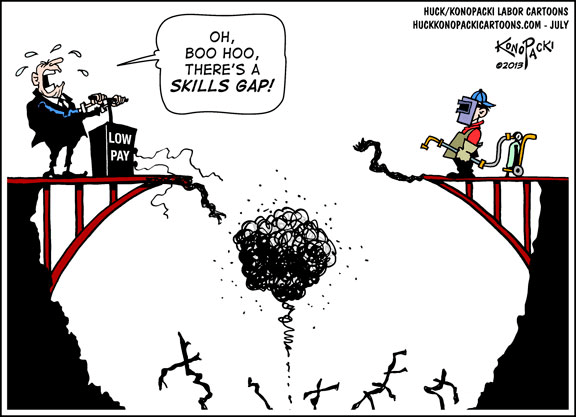

Examples of other skill gaps I’ve noticed include:
Tip
If you think you have a lot of skill gaps, then you can brush up your skills with our SEO academy. Once you’ve completed that, you can fast-track your knowledge by taking a course like Tom Critchlow’s SEO MBA, or you can try to develop these skills through your job.
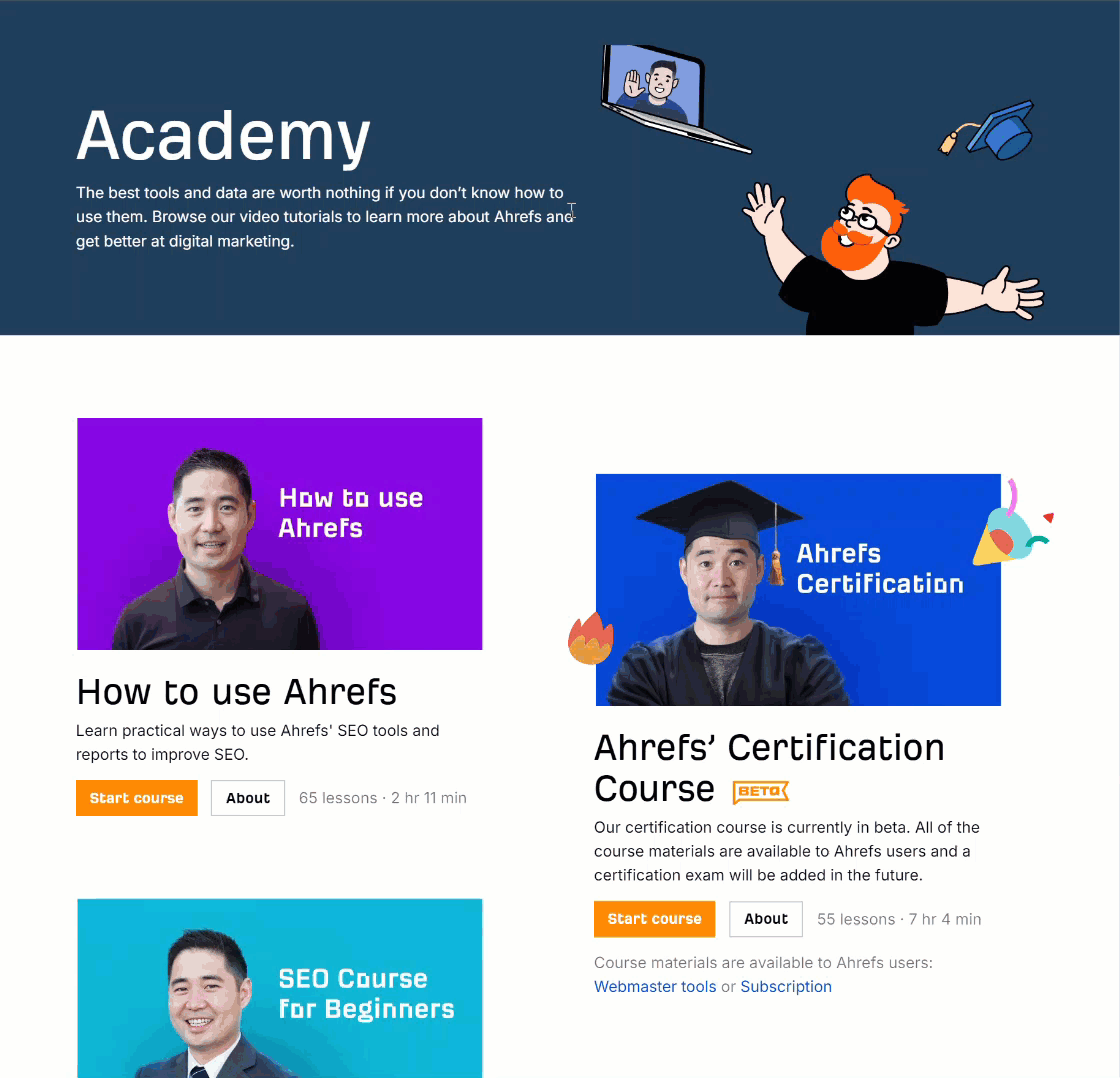

As a junior in any company, it can be hard to get your voice heard amongst the senior crowd. Ten years ago, I shared my wins with the team in a weekly group email in the office.
Here’s what you should be sharing:
- Praise from 3rd parties, e.g. “the client said they are impressed with the work this month.”
- Successful performance insights, e.g “following our SEO change, the client has seen X% more conversions this month.”
- Examples of the work you led, e.g. if your leadership and decision-making led to good results, then you need to share it.
At Ahrefs I keep a “wins” document. It’s just a simple spreadsheet that lists feedback on the blog posts I’ve written, the links I’ve earned and what newsletters my post was included in. It’s useful to have a document like this so you have a record of your achievements.
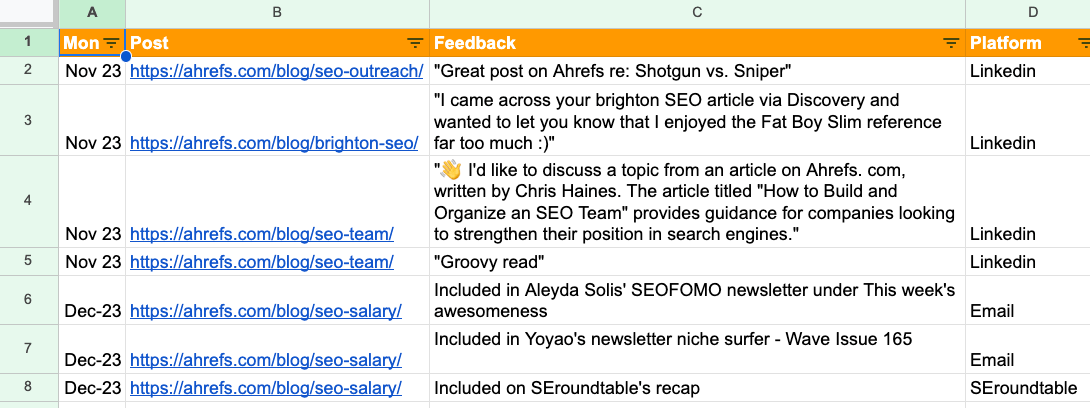

Sidenote.
Junior SEOs sometimes talk about the things “we” achieved as a team rather than what they achieved at the interview stage. If you want the SEO Lead role, remember to talk about what you achieved. While there’s no “I” in team, you also need to advocate for yourself.
One of my first big wins as an SEO was getting a link from an outreach campaign on Buzzfeed. When I went to Brighton SEO later that year and saw Matthew Howells-Barby sharing how he got a Buzzfeed link, I realized that this was not something everyone had done.
So when I did manage to become an SEO Lead, and my team won a prize in Publicis Groupe for our SEO performance, I made sure everyone knew about the work we did. I even wrote a case study on the work for Publicis Groupe’s intranet.
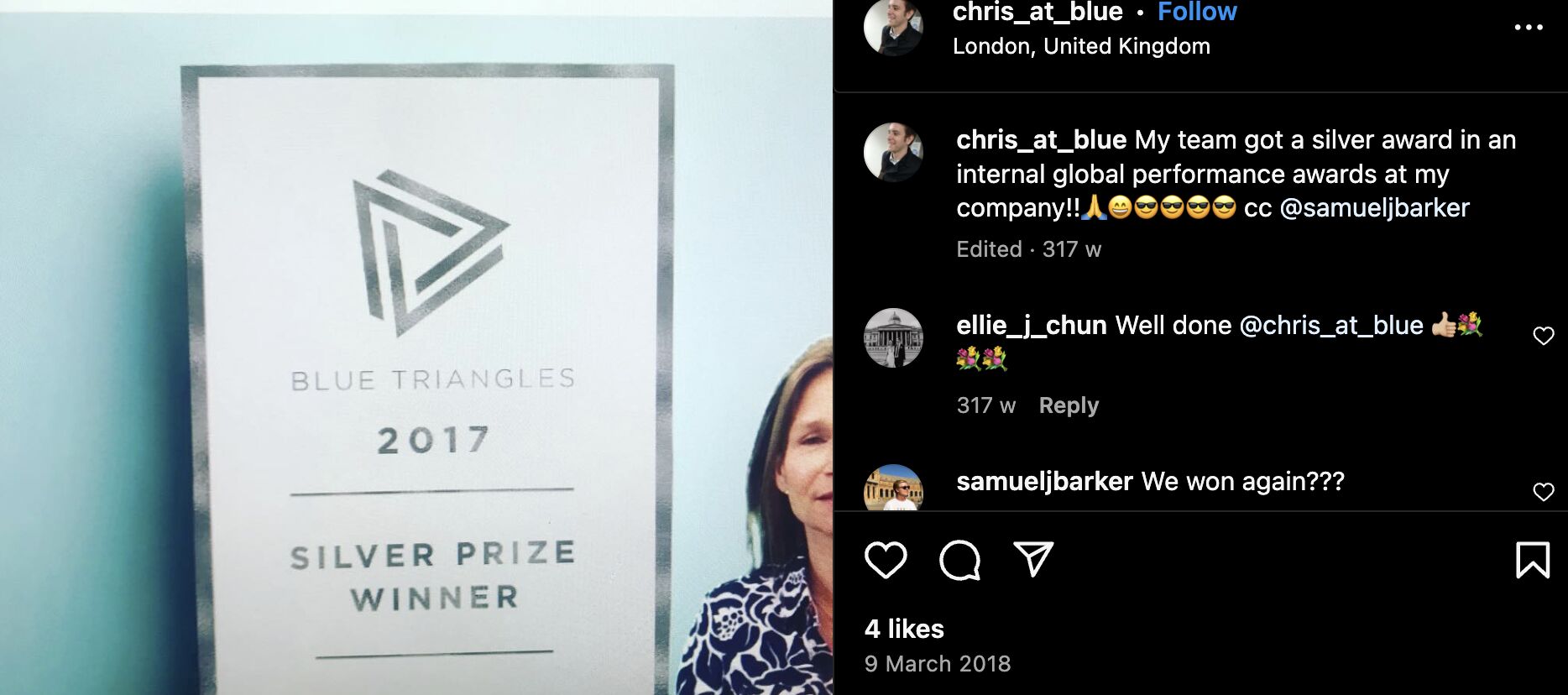

I’ve worked with some incredibly talented people, many of whom have helped me in my career.
I owe my big break to Tim Cripps, Laura Scott, and Kevin Mclaren. Without their support and encouragement, I wouldn’t be where I am today. Even before that, David Schulhof, Jodie Wheeler, and Carl Brooks let me mastermind some bonkers content campaigns that were lucky enough to succeed:


I wasn’t even an SEO Lead at that point, but they gave me the reins and trusted me.
So, how can you find your tribe?
- Speak to recruiters – they might hold the ticket to your next dream job. I spoke to many recruiters early in my career, but only two recruiters delivered for me—they were Natasha Woodford, and Amalia Gouta. Natasha helped me get a job that filled my skill gap, and Amalia helped me get my first SEO Lead role.
- Go to events and SEO conferences, and talk to speakers to build connections outside of your company.
- Use LinkedIn and other social media to interact with other companies or individuals that resonate with you.
Many senior SEO professionals spend most of their online lives on X and LinkedIn. If you’re not using them, you’re missing out on juicy opportunities.
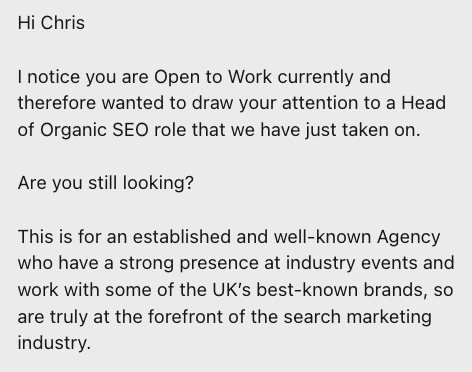

Sharing your expertise on these platforms is one of the easiest ways to increase your chances of getting a senior SEO role. Because, believe it or not, sometimes a job offer can be just a DM away.
Here’s some specific ideas of what you can share:
- Share your thoughts on a trending topic – like the latest Google algorithm update.
- Share what you learned during the course of a campaign.
- Ask the community for their thoughts on a certain topic.
I’ve recently started posting on LinkedIn and am impressed by the reach you can get by posting infrequently on these topics.
Here’s an example of one of my posts where I asked the community for help researching an article I was writing:
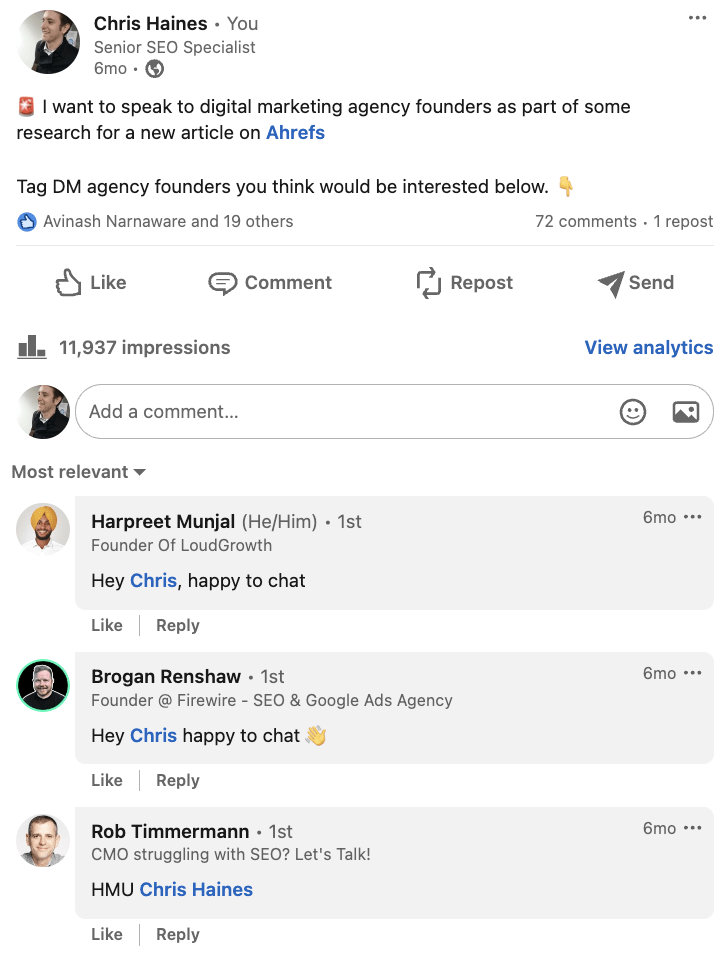

And here is the content performance across the last year from posting these updates.
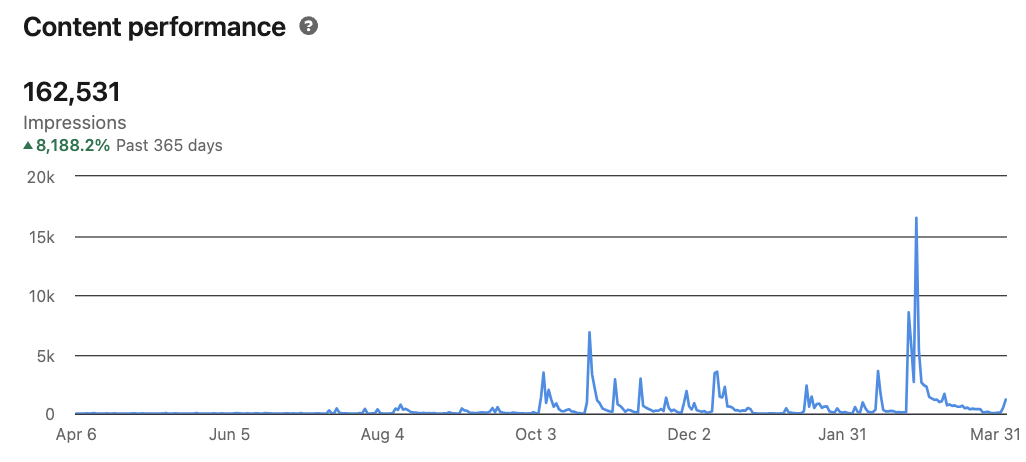

I’m clearly not a LinkedIn expert—far from it! But as you can see, with just a few months of posting, you can start to make these platforms work for you.
Godard Abel, co-founder of G2, talked on a podcast about conscious leadership. This struck a chord with me recently as I realized that I had practiced some of the principles of conscious leadership—unconsciously.
You can start practicing conscious leadership by asking yourself if your actions are above or below the line. Here are a few examples of above and below-the-line thinking:
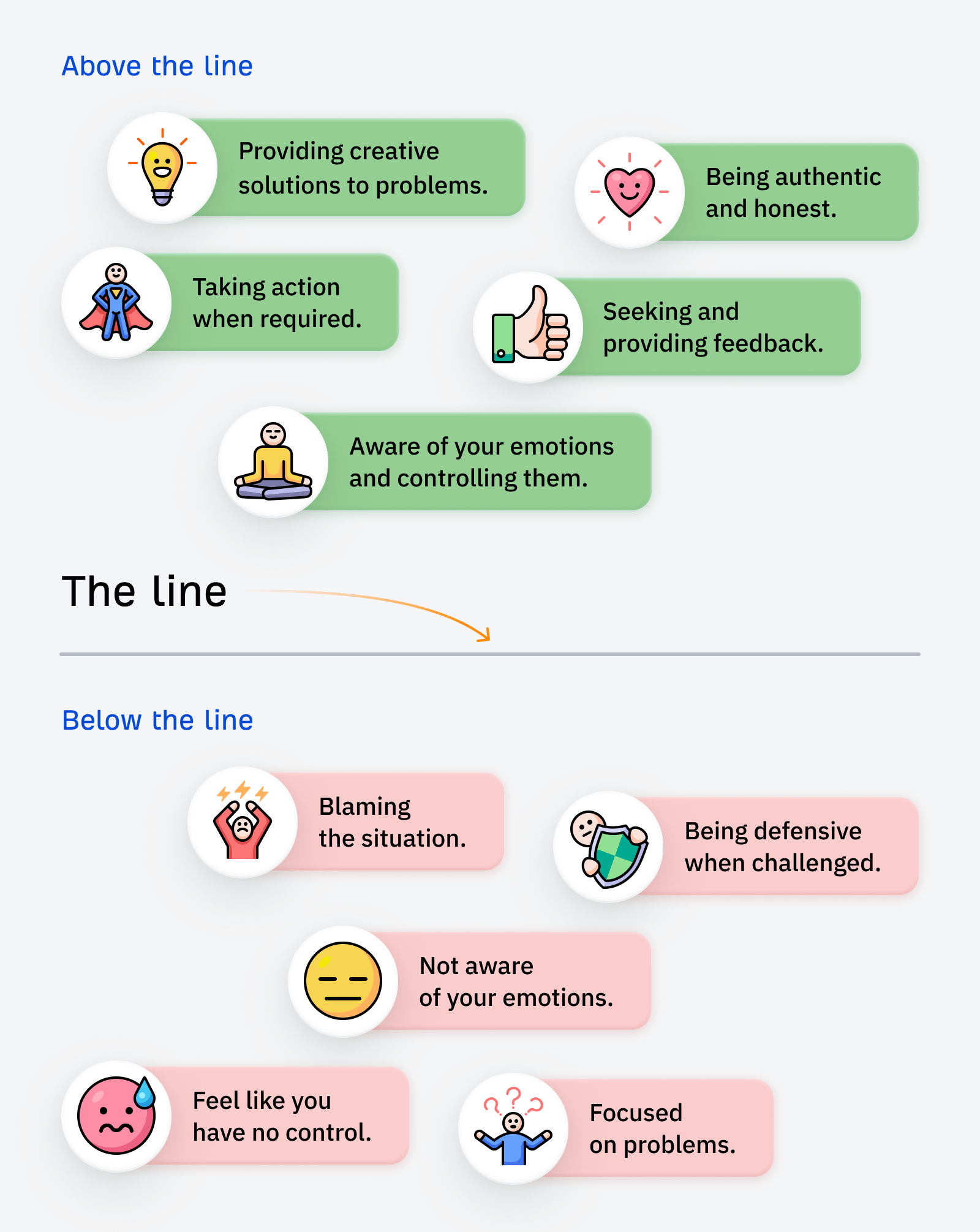

If you want a senior SEO role, I’d suggest shifting your mindset to above-the-line thinking.
In the world of SEO, it’s easy to blame all your search engine woes on Google. We’ve all been there. But a lot of the time, simple changes to your website can make a huge difference—it just takes a bit of effort to find them and make the changes.
SEO is not an exact science. Some stakeholders naturally get nervous if they sense you aren’t sure about what you’re saying. If you don’t get their support early on then you fall at the first hurdle.


To become more persuasive, try incorporating Aristotle’s three persuasive techniques into your conversations.
- Pathos: use logical reasoning, facts, and data to present water-tight arguments.
- Ethos: establish your credibility and ethics through results.
- Logos: make your reports tell a story.
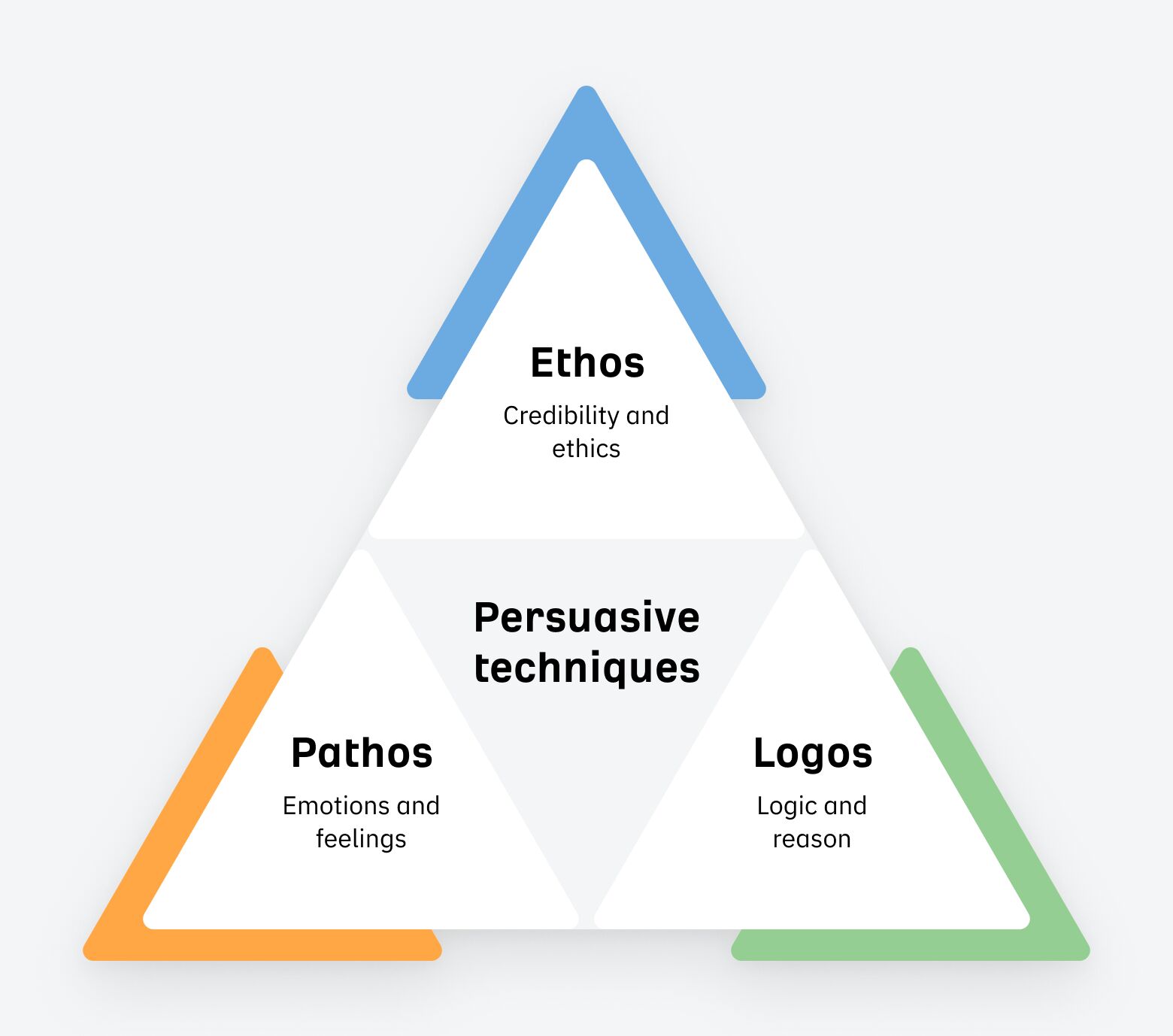

Then sprinkle in language that has a high level of modality:
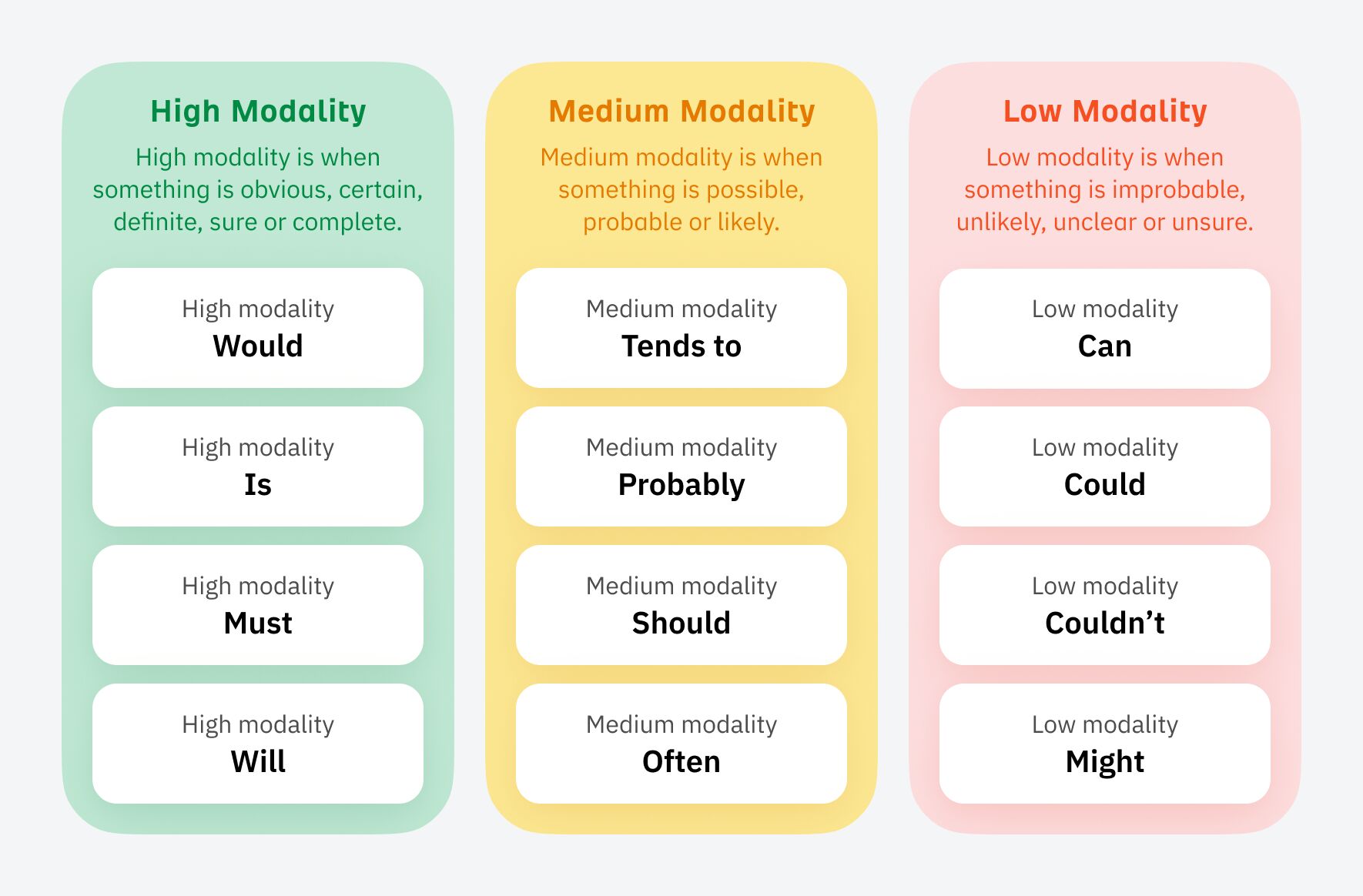

Some people will be able to do this naturally without even realizing it, but for others, it can be an uphill struggle. It wasn’t easy for me, and I had to learn to adapt the way I talked to stakeholders early on.
The strongest way I found was to appeal to emotions and back up with data from a platform like Ahrefs. Highlight what competitors have done in terms of SEO and the results they’ve earned from doing it.
Sidenote.
You don’t have to follow this tip to the letter, but being aware of these concepts means you’ll start to present more confident and persuasive arguments for justifying your SEO strategies.
When I started in SEO, I had zero connections. Getting a job felt like an impossible challenge.
Once I’d got my first SEO Lead job, it felt stupidly easy to get another one—just through connections I’d made along the way in my SEO journey.
I once got stuck on a delayed train with a senior member of staff, and he told me he was really into Google Local Guides, and he was on a certain high level. He said it took him a few years to get there.
Local Guides is part of Google Maps that allows you submit reviews and other user generated content
When he showed me the app, I realized that you could easily game the levels by uploading lots of photos.
In a “hold my beer” moment, I mass downloaded a bunch of photos, uploaded them to Local Guides and equaled his Local Guide level on the train in about half an hour. He was seething.
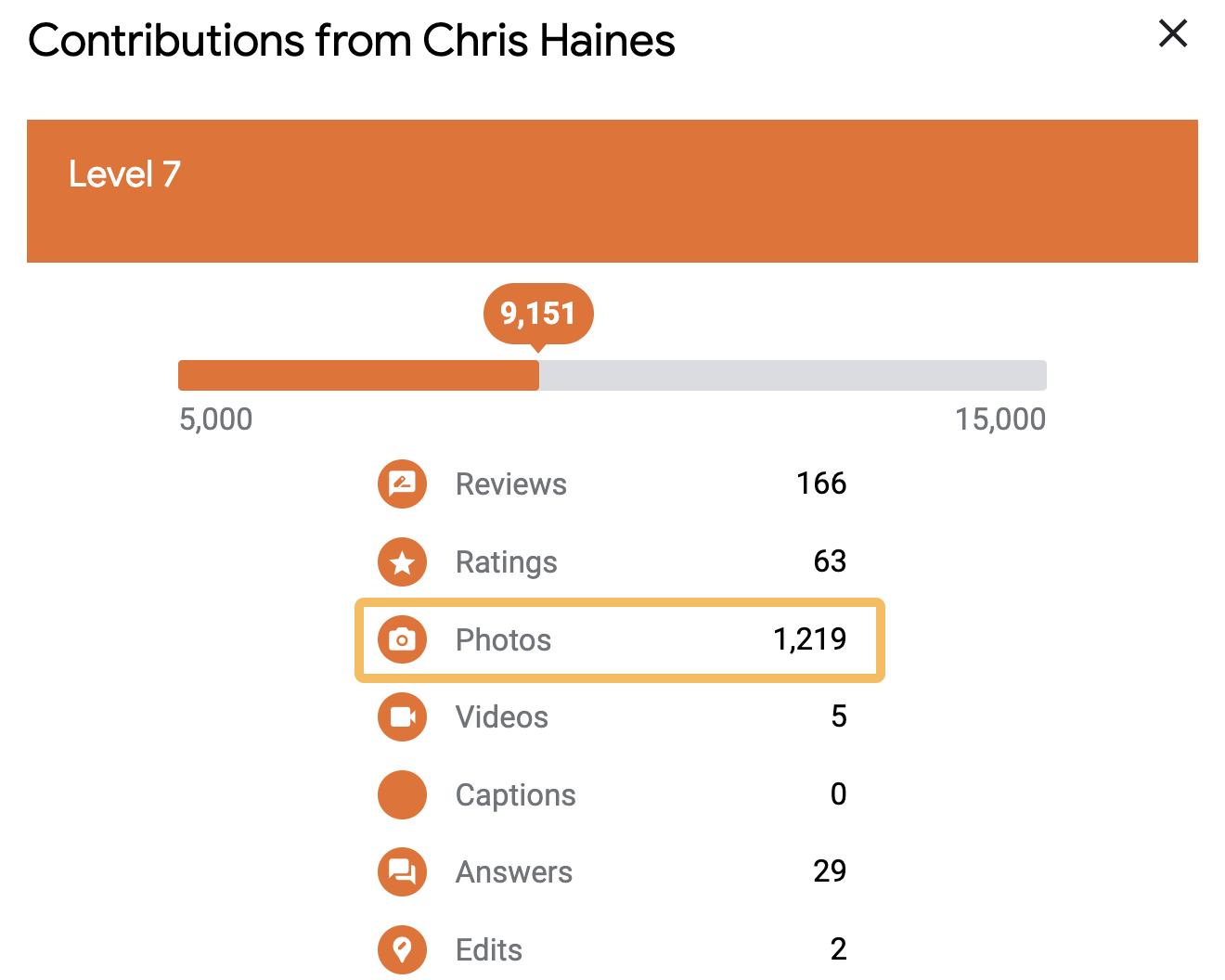

One of the photos I uploaded was a half-eaten Subway. It still amazes me that 50,974 people have seen this photo:
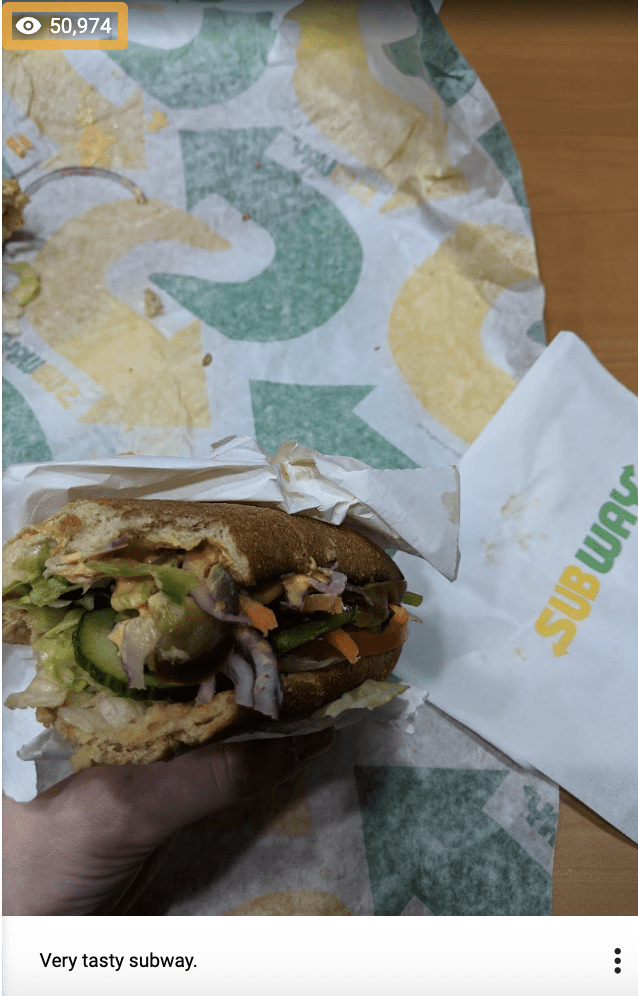

This wasn’t exactly SEO, but the ability to find this ‘hack’ so quickly impressed him, and we struck up a friendship.
The next month that person moved to another company, and then another few months later, he offered me an SEO Lead job.
Tip
Build connections with everyone you can—you never know who you might need to call on next.
Final thoughts
The road to becoming an SEO Lead seems straightforward enough when you start out, but it can quickly become long and winding.
But now armed with my tips, and a bucket load of determination, you should be able to navigate your way to an SEO Lead role much quicker than you think.
Lastly, if you want any more guidance, you can always ping me on LinkedIn. 🙂
-

 PPC4 days ago
PPC4 days ago19 Best SEO Tools in 2024 (For Every Use Case)
-

 MARKETING7 days ago
MARKETING7 days agoWill Google Buy HubSpot? | Content Marketing Institute
-
SEARCHENGINES7 days ago
Daily Search Forum Recap: April 16, 2024
-

 SEO6 days ago
SEO6 days agoGoogle Clarifies Vacation Rental Structured Data
-

 MARKETING6 days ago
MARKETING6 days agoStreamlining Processes for Increased Efficiency and Results
-
SEARCHENGINES5 days ago
Daily Search Forum Recap: April 17, 2024
-

 PPC7 days ago
PPC7 days agoHow to Collect & Use Customer Data the Right (& Ethical) Way
-

 SEO6 days ago
SEO6 days agoAn In-Depth Guide And Best Practices For Mobile SEO

















You must be logged in to post a comment Login